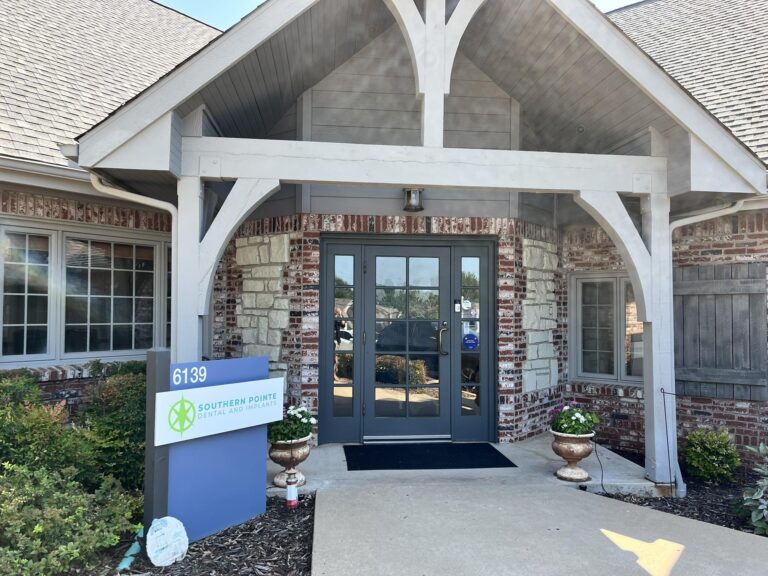Full Mouth Dental Implants Might Be the Solution You’ve Been Waiting For
Maybe you’ve lost or broken multiple teeth due to tooth decay, tooth extraction, injury, or normal wear and tear from aging. Perhaps you were born with dental conditions that need to be addressed. No matter the cause, full mouth dental implants can help restore how you look and feel.
What Are Dental Implants?
Dental implants are the most reliable solution available for tooth replacement. Serving as an artificial tooth root, dental implants are made of titanium and offer unparalleled stability and durability. And they have a higher success rate than other ways to replace missing teeth.
Dental implants can be placed for a single tooth, multiple teeth, or a full set of neighboring teeth. And they even can be used for some patients with partial bone loss.
Implants also can be used for partial dentures, full denture implants, or what’s called fixed dentures. Replacing a group of missing teeth, fixed dentures are secured to dental implants so they can’t be removed. They work similar to a bridge but are held in place with one or more implants instead of natural teeth.
After getting dental implants, you can expect higher self-esteem as a result of your new smile and improved appearance. You also can eat your favorite foods again! Learn more about the many benefits of dental implants, which can improve your overall health, not just your smile.
What Are Full Mouth Dental Implants?
Full mouth dental implants — also called full teeth implants, or all on four implants — offer an expert solution if you have multiple missing or broken teeth. They offer permanent and natural-looking tooth replacement to give you a brand new, confident smile.
Full mouth implants replace all of your natural teeth with prosthetic teeth that are secured by dental implants. Rather than being removable like traditional dentures that rest on your gums, full mouth dental implants are secured in place, and you can’t remove them. They won’t slip or trap food, and they ensure a comfortable, pain-free fit that allows you to eat, drink, and speak with ease.
The comprehensive approach of full teeth implants can address all your dental care needs, no matter how complex. And with proper care, dental implants can last the rest of your life.
Who Can Benefit From Full Mouth Dental Implants?
Dental implants offer a great solution for a variety of people. If you face any of these issues, full teeth implants may be your best long-term solution:
- A misaligned bite
- Extensive wear and tear from natural aging or teeth grinding
- Lasting pain in your jaw
- Multiple missing or broken teeth
- Problems like gum disease, chronic infection, or tooth decay
- Severe tooth damage
What Is Full Mouth Reconstruction?
Whole mouth reconstruction combines various dental procedures to address all your dental issues in a single treatment plan. That plan is customized just for you, based on your dental needs, preferences, and goals.
Your personalized plan may include dental implants along with some or all of these treatments:
- Dental crowns
- Dental bridges
- Dentures
- Periodontal gum therapy
- Tooth-colored fillings
- Veneers
With full mouth reconstruction — or with any of these treatment options used individually — it’s worth finding an experienced team that can offer you a long-lasting solution and help you regain your ability to eat, speak, and smile for the camera.
Dental Implants Improve Your Smile — and Your Overall Health
For many, dental implants provide an excellent way to restore their smile after losing a tooth. As an artificial tooth root, implants provide the strong foundation needed for tooth replacement and may be just the option you’re looking for.
The Many Benefits of Dental Implants
Dental implants do a lot more than just allow a beautiful smile: They improve your oral health — even your overall health — as well. Here’s how.
Restoring Your Ability to Chew
Dental implants function like normal teeth. When you’re able to chew foods properly, you can give your body the nutrients it needs through a healthy diet. Chewing fully and with normal force also helps digestion since you can break down food into smaller pieces.
Preventing Gum Disease and Tooth Decay
Implants are made of titanium so they aren’t susceptible to harm from bacteria, but your natural teeth can decay over time. Since food and bacteria tend to stick around in open places in your mouth, dentures and dental implants can offer protection to your surrounding natural teeth. By closing gaps, harmful bacteria are less likely to grow and cause gum disease or tooth decay down the road.
Offering Comfort and Convenience
Dental implants are surgically placed into your jaw. They offer a permanent, low maintenance solution. Unlike traditional dentures, they don’t shift in place or require any special care.
Protecting You Against Bone Loss
Your jawbone requires the pressure from normal chewing to stay healthy. When you’re missing a tooth and it doesn’t get replaced right away, you run a number of risks. The bone’s lack of stimulation can cause your jawbone to break down and your facial structure to change.
This bone loss can affect the immediate area as well as neighboring teeth. And waiting too long can impact your ability to get dental implants, since they rely on healthy bone for stability. Bottom line: Don’t wait too long before talking with your dentist about tooth replacement.
Keeping Your Natural Teeth in Place
When you’re missing a tooth, over time your other teeth move toward the empty space. And if, for example, a bottom tooth is missing, it can cause the top tooth to move as well. This changes your bite alignment, which is needed for chewing food. Dental implants prevent this drift and preserve your natural bite.
Improving Your Smile — And Your Speech
Dental implants are made to match your natural tooth color and shape, but they do more than just improve your smile in selfies. When you’re missing teeth, the way you pronounce words may not be as clear as it could be. Proper support from dental implants can actually improve your speech — and thus your confidence in day-to-day interactions with others.
Enhancing Your Quality of Life
A healthy mouth leads to a healthy body. According to the American Dental Association, diseases of the mouth and the body share a lot of common risk factors, including smoking and poor diet. And poor oral health has been linked to a number of other health conditions such as heart disease and diabetes. In addition, feeling confident in your smile, speech and eating habits can improve your overall well-being.
Let Us Help You Get on the Path to Improved Health
To ensure the best outcome, be sure to select an experienced dental implant dentist. The expert team at Southern Pointe Dental and Implants in Tulsa offers different types of implants, including full mouth dental implants. Our periodontists focus on your unique needs and preferences. We offer dental implants for seniors, as well as adults of any age.
To learn more about implants, or just for a little dental advice, call us today.
Dental Emergencies That Can’t Wait
It can be tempting to ignore tooth pain or bleeding gums when you have a lot going on. But it’s important not to wait too long before getting help. While some dental conditions can wait, many require urgent treatment. Learn more about the different types of dental emergencies and how to determine if you need to contact your dentist to schedule an emergency appointment.
What is a Dental Emergency?
Dental emergencies include any injury to your mouth, tooth, gums or the surrounding tissue that causes severe pain, bleeding you can’t control, or a broken facial bone. And most fall into one of these three categories: complications following a procedure, infection or trauma.
Some dental emergencies don’t cause pain right away but can evolve into a more serious condition. On the other hand, mouth pain or sores could be the first sign of something more serious. Either way, it takes an emergency dentist to get to the root, so to speak, of the problem.
While the emergency room is the perfect place for many other types of urgent issues, hospitals may not be equipped to perform emergency dental procedures. So, it’s best to find specialized emergency dental services for mouth-related pain and injuries near you.
How to Handle Dental Emergencies
If you decide your situation is an emergency, it’s important to know what to do next.
A Knocked-Out Tooth
If your tooth gets knocked-out, quick action could allow us to save your original tooth. Hold your tooth by the top and put it back in place as quickly as possible since your mouth is actually the best place to store it. If that isn’t an option, carefully place it in a clean jar. Avoid wrapping it or putting it in a bag that could damage the roots and reduce the chances of saving the tooth.
A Broken Tooth
Your tooth enamel is the strongest material in your body. Your teeth can handle a lot of pressure and a lot of use, but they aren’t indestructible. Chips, cracks, and breaks can develop slowly over time or happen more suddenly. If you fall or have another injury that causes a broken tooth with severe pain, don’t delay seeking care for it.
A Toothache
A painful tooth can be caused by a wide variety of issues, some serious and some not. If over-the-counter pain medication doesn’t offer relief — or if your pain is severe or lasting — it’s time to have it looked at in a dentist office.
Soft-Tissue Damage
Your mouth is made up of different soft tissues, including your lips, gums, tongue, and the inside of your cheeks. If you have uncontrolled bleeding or a serious injury to any of these soft tissues, it’s important to reach out to a dentist who can help you determine if you need emergency dental services or can wait a few days for an appointment. A dentist can also advise you on the best ways to stop bleeding or deal with the issue in the meantime.
Emergency Dental Care in Tulsa
If you need an urgent care dentist in Tulsa, look no further. Southern Pointe Dental and Implants is a same-day dentist office. Our experts are highly trained in urgent dental care, and we block time in our daily schedules for emergency patients.

